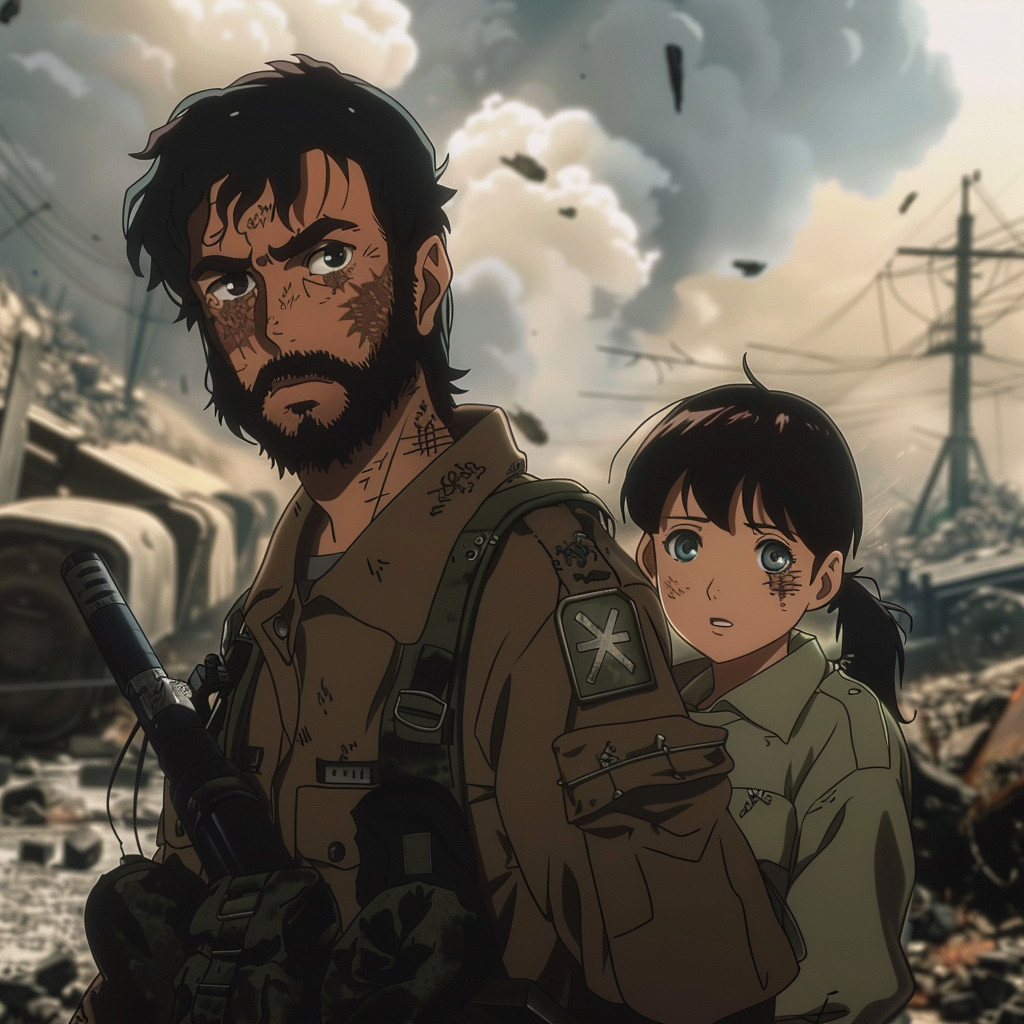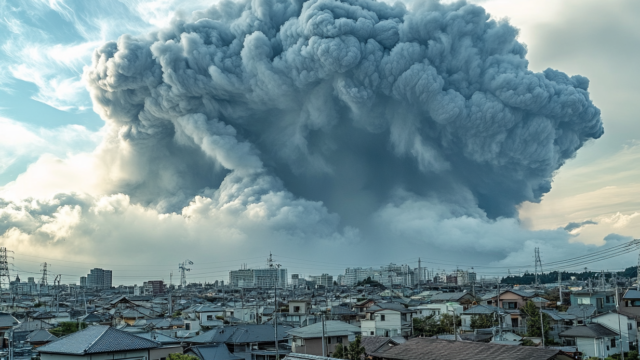
Iran-Israel Clash Risks Regional Instability
Iran launched an unprecedented missile and drone attack on Israel in retaliation for an alleged Israeli strike on an Iranian embassy. The escalating conflict between the two Middle Eastern powers threatens to destabilize the entire region if it spirals into a full-scale war. The international community is urging restraint to prevent a wider conflagration. (55語)
日本語訳
「イラン・イスラエル衝突、地域の不安定化リスク」
イランは、イラン大使館に対する攻撃への報復として、ミサイルとドローンによる前例のないイスラエル攻撃を行った。中東の2つの軍事大国間の紛争がエスカレートし、全面戦争に発展すれば、地域全体が不安定化する恐れがある。国際社会は、さらなる紛争拡大を防ぐために自制を求めている。

単語・熟語チェック
・clash 衝突、対立
・risk ~の危険性がある
・regional 地域の
・instability 不安定
・retaliation 報復
・alleged ~とされる、申し立てられた
・embassy 大使館
・escalate エスカレートする、悪化する
・spiral 急激に悪化する、螺旋状に進む
・destabilize 不安定にする
・conflagration 大火災、大紛争
・restraint 自制、抑制
単語解説
・clash
⇒衝突する、対立するという意味の動詞で、名詞形だと「衝突」「対立」を表します。異なる勢力や主張がぶつかり合う状況を指します。文化や価値観の違いから生じる “clash of civilizations” のように使われることもあります。
・retaliation
⇒仕返し、報復という意味の名詞。動詞は retaliate で「仕返しする」「報復する」という意味。相手からの攻撃や妨害に対して、同じような手段で反撃することを指します。”an eye for an eye” (目には目を)の考え方に基づく行為とも言えます。
・alleged
⇒~だと主張された、とされる、申し立てられたという意味の形容詞。allege が動詞形で「主張する」「申し立てる」という意味。確実ではないが、そう言われている、との含みを持たせる言葉です。容疑者を指す “alleged criminal” のように使われることが多いです。
・spiral
⇒螺旋状に進む、急激に悪化するという意味の動詞。名詞だと「螺旋」「渦巻き」「急激な悪化」などを表します。コントロールを失って悪循環に陥るさまを表現するのによく使われます。”spiral into depression” (うつ状態に陥る)など、比喩的な使い方も多いです。
・conflagration
⇒大火事、大紛争、激しい論争などの意味がある名詞。「燃え広がる」という語源の通り、火災が広範囲に及ぶ様子を表します。転じて、戦争など大規模な武力衝突にも使われます。平和な状態が一気に崩れ、混乱が拡大するイメージを伴います。
原ちゃんチェック
イランとイスラエル、中東の雄同士の衝突は本当に心配ですね。歴史的に見ても、両国の対立は根深いものがあります。
イスラエルによるイラン大使館への攻撃は、国際法上も問題があるように思えます。外交官の保護は大切な原則ですからね。一方で、イランの報復攻撃も、さらなる悪循環を招きかねません。
戦争になれば、多くの犠牲者が出るのは必至です。難民問題など人道危機も広がるでしょう。中東情勢が混乱すれば、世界経済にも大きな影響が及びそうです。
国連など国際社会による仲裁や和平交渉が求められる事態だと思います。当事国だけでなく、域内外の国々が協調して、外交的解決を目指す必要がありそうです。軍事力の行使には歯止めをかけつつ、対話を通じて平和的な関係を築いてほしいものです。
関連URL
原田英語深堀りチェック
【戦争に関する英単語&英語フレーズ集】
1. Ceasefire [停戦] – A temporary suspension of fighting, typically one during which peace talks take place. (通常、平和交渉が行われる間の戦闘の一時的な停止)
2. Collateral damage [付随的損害] – Unintended civilian casualties and destruction caused by military action. (軍事行動によって意図せずに発生する民間人の死傷者や破壊)
3. Conscription [徴兵] – The compulsory enlistment of people in a national service, most often a military service. (国民を国家の奉仕、最も多くは軍隊に強制的に入隊させること)
4. Foxhole [塹壕] – A small pit or trench used by soldiers for shelter against enemy fire or as a firing point. (敵の砲火から身を守るため、または射撃地点として兵士が使用する小さな穴や溝)
5. No man’s land [死地] – The unoccupied area between the front lines of two opposing armies, where it is very dangerous to be. (2つの敵対する軍隊の最前線の間の無人地帯で、そこにいるのは非常に危険)
6. Shell shock [心的外傷後ストレス障害] – A term coined in World War I to describe what is now known as post-traumatic stress disorder (PTSD). (第一次世界大戦で作られた言葉で、現在心的外傷後ストレス障害(PTSD)として知られているものを表す)
7. Trench warfare [塹壕戦] – A type of combat in which opposing troops fight from trenches facing each other. (向かい合った塹壕から敵対する軍隊が戦う戦闘の種類)
8. War of attrition [消耗戦] – A military strategy in which a belligerent attempts to win a war by wearing down the enemy to the point of collapse. (交戦国が敵を崩壊するまで消耗させることによって戦争に勝とうとする軍事戦略)
9. Guerrilla warfare [ゲリラ戦] – A form of irregular warfare in which small groups of combatants use military tactics to fight a larger and less-mobile traditional military. (少数の戦闘員が軍事戦術を用いてより大きく機動性の低い従来の軍隊と戦う不正規戦の一形態)
10. Prisoner of war (POW) [捕虜] – A person, whether a combatant or a non-combatant, who is held captive by a belligerent power during or immediately after an armed conflict. (戦闘員であるか非戦闘員であるかにかかわらず、武力紛争の最中または直後に交戦国に捕らえられた人)
11. Friendly fire [誤射] – An attack by military forces on their own or allied forces, often due to misidentification or miscommunication. (誤認や連絡ミスによる、自軍または同盟国軍への攻撃)
12. All’s fair in love and war [恋愛と戦争に不正はない] – A proverb suggesting that in extreme circumstances like love or war, any conduct is permissible. (恋愛や戦争のような極端な状況では、どんな行為も許されるということわざ)
13. Fog of war [戦場の霧] – The uncertainty and confusion experienced by participants in military operations. (軍事作戦の参加者が経験する不確実性と混乱)
14. Pyrrhic victory [ピュロスの勝利] – A victory that is so costly that it is tantamount to defeat. (敗北に等しいほどコストのかかる勝利)
15. Scorched earth [焦土作戦] – A military strategy of burning or destroying buildings, crops, or other resources that might be useful to the enemy while advancing through or withdrawing from an area. (敵の進行や撤退の際に、敵に有用かもしれない建物、作物、その他の資源を焼いたり破壊したりする軍事戦略)
16. Hearts and minds [民心] – A term referring to the strategy of influencing popular opinion and support in favor of one side of a conflict. (紛争の一方の側に有利になるように世論と支持に影響を与える戦略を指す言葉)
17. Saber rattling [武力による威嚇] – A show of military power or the threat of military action to intimidate another country. (他国を脅すための軍事力の誇示や軍事行動の脅威)
18. Trojan horse [トロイの木馬] – A person or thing intended to undermine or destroy from within. (内部から弱体化させたり破壊したりすることを目的とした人物や物事)
19. White flag [白旗] – A flag used to signal surrender or a desire to negotiate. (降伏や交渉の意思を示すために使用される旗)
20. Boots on the ground [地上部隊] – The deployment of ground forces in a conflict or potential conflict situation. (紛争や潜在的な紛争状況での地上部隊の展開)






